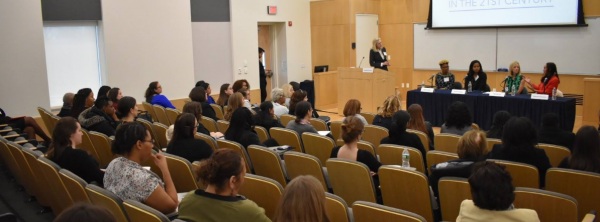"To kick off the 2017 Women’s Leadership Conference, I listened to a conversation between Julie Smith and Lara Brown, two incredibly accomplished women, about their experiences working in male dominated fields, and navigating women’s issues and leadership in often hostile environments. They rattled off several anecdotes of blatant sexism - one of my favorites was when Julie Smith walked into a conference and was immediately directed to the “spouse’s area” - to which she responded, “what do you mean? I’m the keynote speaker for this event.” Instances like that capture the experiences of women in the workplace in a nutshell, and the stories that the two women shared seemed to resonate with every other woman in the room.
They discussed their own lives and experiences with being a mother, talking to bosses, being talked down to or talked over, and having their intellectual ability undermined. It seemed that one of the biggest issues they experienced was in nuances of speech - the way they are always expected to say yes. Lara Brown said something that resonated with me on this topic, “If you never say no, then your yes means nothing.”
To wrap up the discussion, they both shared the ways in which they try to remedy the discrimination faced by women everywhere - primarily in the form of supporting women themselves. Julie Smith said that the most impactful things in her life were always the times when women have supported her, and Lara Brown said that she believes that every woman should compliment another woman every day. That is a simple yet extremely effective way to subtly combat everyday sexism, and something I try to abide by in my everyday life as well.
I sat in and listened to the panel on Nasty News, which included five prominent women in media discussing media and journalism in the Trump era. They discussed Ivanka Trump’s role and how they media is not portraying it accurately as nepotism, and the way the President’s Twitter has completely changed White House press briefings, and also the various sources of fake news, which they claim can come from anywhere. One of the panelists who works for the Daily Mail said that reporters are afraid to ask certain questions at briefings, because if they ask a question that isn’t well received then they’ll never get called on again. This is extremely dangerous and was labeled by other panelists as the stifling of free press.
The topic that caught my attention the most was when one of the panelists from the Washington Post brought up the D.C. missing girls issue. She said that there was no evidence to support claims of sex trafficking, and that the girls were just runaways - but the liberal media kept labeling it as sex trafficking, which she claimed to be an instance of fake news being perpetuated from the left. I disagree with this wholeheartedly and think that labeling liberal critique of centrist media as fake news is equally harmful as fake news from the right. There was evidence to support claims of sex trafficking - the opposition to this idea was being perpetuated by the police, which have a historically bad record of protecting black communities in DC. I think that to label every opposition as fake news creates more subjectivity within the definition of truth, which is what we are supposedly trying to combat. Unfortunately, I did not get to ask a question about this, but I did get the email of the panelist from the Post and plan to follow up with her on this topic.
Overall, I think the panel was really interesting and hard-hitting, discussing a lot of pressing issues in Trump-era media."
-Emma Anderson


